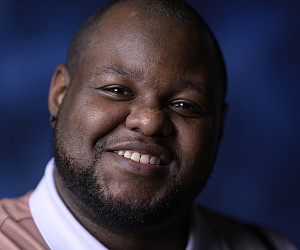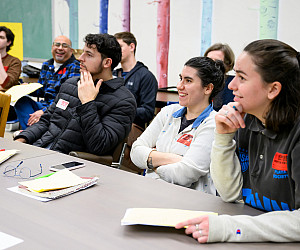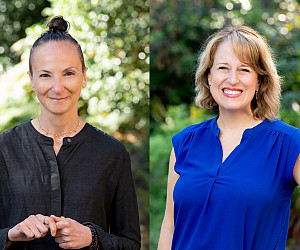Graduate Student Clinicians Offer Trans-Competent Mental Health Care, Address Critical Need in Oregon
Trans-competent mental health care providers are knowledgeable and skilled in providing affirming and ethical mental health care to individuals across their developmental lifespan, while also understanding the issues and challenges that are unique to trans and/or nonbinary clients.
On Tuesday, September 12, six graduate student clinicians began offering services to trans and nonbinary youth and young adults, addressing a critical need in the community and launching the Community Counseling Center’s most recent service expansion.
The pilot program is a partnership between the Community Counseling Center and TransActive Gender Project that aims to increase access to trans-competent mental health care across Oregon. Professional Mental Health Counseling Professor Rafe McCullough supervises the participating cohort of graduate students and describes trans-competent mental health care providers as being knowledgeable and skilled in providing affirming and ethical mental health care to individuals across their developmental lifespan, while also understanding the issues and challenges that are unique to trans and/or nonbinary clients. This may include concerns about family acceptance or lack thereof, navigating ongoing disclosure, personal safety, school and career issues, medical and social aspects, and legal documentation. He adds that individuals who identify as trans and nonbinary also encompass various cultural and socioeconomic backgrounds, ages, racial and ethnic identities, gender identities, and sexual and affectional orientations, so it’s also important for mental health care providers to understand the implications of trans clients’ experiences of racism, ableism, and other forms of personal and structural discrimination.
“Trans-competent care is very important because of ongoing data showing that trans individuals experience disproportionately high rates of depression, anxiety, suicidality, substance abuse, and other mental health disparities,” says McCullough. “Lack of mental health provider knowledge or experience can perpetuate these poor mental health outcomes.”
Approximately 20,000 individuals currently identify as transgender in Oregon. According to the most recent Healthy Teens Survey, 5-6% of Oregon youth identify as trans, with 54% seriously considering suicide within the past year, 77% reporting anxiety, and 63% reporting depression.
The Community Counseling Center is working to address the need for trans-competent mental health care in Oregon in a sustainable and intentional manner, beginning with a small number of students in the Professional Mental Health Counseling Program. The participating student clinicians each received an initial training to work with trans individuals, with a specific focus on trans youth and their families. Concurrently, these students are also serving a small caseload of trans individuals ranging in age from 8 years old to adult.
“As we build our capacity to train more student clinicians, we will also be training more clinical supervisors to work with them,” says McCullough. “Not only will we be increasing the number of clinicians trained to provide trans-competent care upon graduation, but we will be increasing trans and nonbinary client access to affordable trans-competent mental health care via our counseling center.”
Nori Valdez Gruber, Community Counseling Center Director, shares that while many of their current clients have been referred to them by TransActive, a referral is not a requirement to access services. Prospective clients can submit an intake form on the CCC’s website and a representative will get in touch to begin the process.
“This is a great opportunity for our emerging clinicians to meet a growing need in our community while gaining the hands-on experience that our programs are known for,” says Gruber.
The Community Counseling Center also provides comprehensive individual, couples/relationship, and family counseling services. Visit their website for a description of the services offered or to schedule an appointment. Fees are based on a sliding scale and the CCC is conveniently located on Barbur Boulevard in Southwest Portland.
More Stories

Alumni Spotlight: Kevin Wright MA ’16
Kevin Wright, EdD, Higher Education Student Affairs MA ’16, was recently named a Class of 2026 Diamond Honoree by the ACPA–College Student Educators International for his work advancing student success and transforming institutions.

Year in Review
Top Stories of 2025
As the calendar year draws to a close, we’ve compiled a sampling of top stories from the undergraduate college, the graduate school, and the law school.

4+1 Program
Five-Year Jumpstart to an Education Career
Lewis & Clark’s Teacher Pathways program supports undergraduate students who dream of becoming educators, offering a BA, MAT, and licensure in just five years.

Endowed Professorships Named for Darwich and FitzGibbon
Associate Professor Lina Darwich and Professor of Music and Director of Choral Activities Katherine FitzGibbon have received endowed professorships for their outstanding scholarly record.